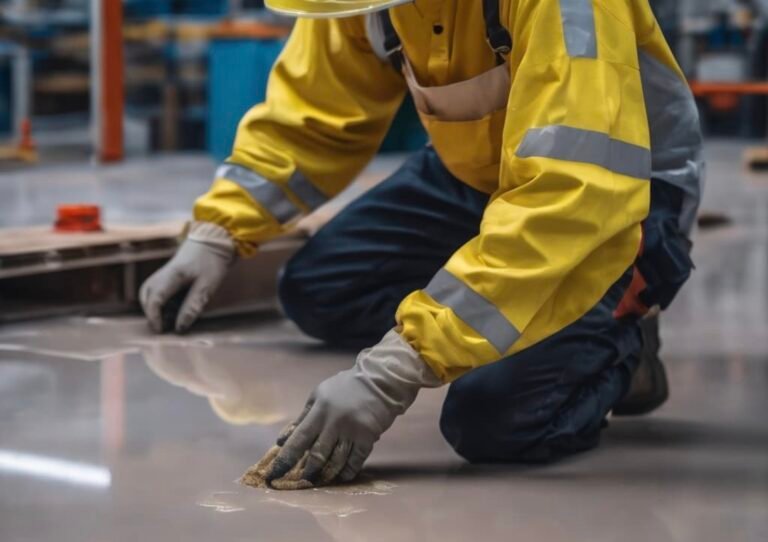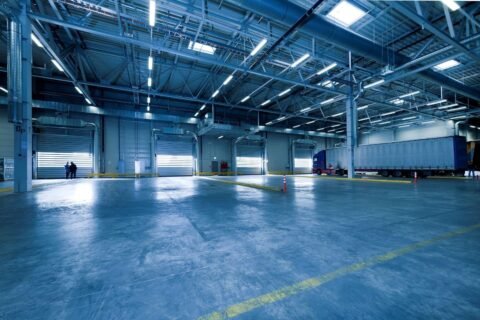When it comes to flooring solutions, epoxy flooring stands out as one of the most durable, cost-effective, and visually appealing options available. Whether you’re looking to install flooring in a commercial, industrial, or residential space, epoxy can transform the look and functionality of the area. Hiring a professional epoxy contractor for flooring installation ensures you get a top-quality finish that lasts for years. This comprehensive guide will explore the advantages of epoxy flooring, the importance of choosing the right contractor, and what to expect during the installation process.
What is Epoxy Flooring?
Epoxy flooring is a type of flooring system that involves applying layers of epoxy, a material made from a mixture of resins and hardeners, to a concrete substrate. When combined, these materials form a rigid, plastic-like surface that is both strong and highly resistant to wear and tear. Epoxy coatings can be customized with various colors, finishes, and additives, making them a versatile choice for a wide range of applications.
Types of Epoxy Flooring
There are several types of epoxy flooring systems, each designed to meet specific needs:
- Self-Leveling Epoxy: This type of epoxy creates a smooth, seamless surface and is commonly used in industrial, commercial, and residential settings. It’s ideal for spaces where cleanliness and aesthetics are a priority, such as hospitals, showrooms, and offices.
- Epoxy Mortar Floors: Known for their high durability and strength, epoxy mortar floors are used in areas where heavy machinery or equipment may be present, such as factories and warehouses. They can withstand impact, chemicals, and heavy traffic.
- Epoxy Flake Floors: This type of epoxy flooring includes decorative flakes that are embedded in the epoxy to create a textured surface. It is often used in garages, showrooms, and retail spaces to provide both aesthetic appeal and slip resistance.
- Graveled Epoxy Floors: One of the most decorative options, this epoxy type allows for custom designs, including logos and patterns, embedded into the flooring. It is often used in high-end commercial spaces to make a bold statement.
- Anti-Static Epoxy Floors: These floors are used in environments sensitive to static electricity, such as laboratories and electronic manufacturing facilities.
Advantages of Epoxy Flooring
Choosing epoxy flooring offers several benefits, making it a popular choice for both commercial and residential applications:
1. Durability and Strength
Epoxy flooring is known for its incredible durability. It can withstand heavy traffic, impact from machinery or equipment, and resist cracking or peeling, making it ideal for industrial and commercial environments. Once fully cured, epoxy becomes a hard, resilient surface that can last for decades.
2. Chemical and Stain Resistance
Epoxy flooring is highly resistant to a wide range of chemicals, oils, and solvents. This makes it an excellent choice for garages, warehouses, and factories where spills and exposure to harsh chemicals are common. Additionally, epoxy is non-porous, meaning it resists staining, making cleaning and maintenance easier.
3. Easy Maintenance
Maintaining epoxy flooring is simple and hassle-free. The seamless and non-porous surface prevents dirt, dust, and grime from accumulating in cracks or crevices. Regular sweeping and mopping are typically all that’s required to keep the floor looking fresh and clean.
4. Aesthetic Versatility
One of the most appealing features of epoxy flooring is its versatility in design. Epoxy can be customized with various colors, patterns, and finishes, allowing you to create a unique look that complements your space. Whether you prefer a high-gloss finish, a textured surface, or decorative flakes, epoxy can be tailored to meet your aesthetic vision.
5. Cost-Effective Solution
Compared to other flooring materials like hardwood, tile, or stone, epoxy is relatively affordable. Its long lifespan, durability, and low maintenance costs make it a cost-effective flooring solution for both large commercial spaces and residential projects.
6. Improved Safety
Epoxy flooring can be enhanced with slip-resistant additives, making it a safe option for environments where safety is a concern. Additionally, its reflective surface can improve visibility in dimly lit areas, further enhancing safety.
7. Environmentally Friendly
Epoxy flooring is a sustainable choice because it reduces the need for frequent replacement and maintenance. Its durability minimizes waste, and its ability to coat existing concrete means that you can avoid removing and disposing of old flooring materials.
Why Hire a Professional Epoxy Contractor?
While epoxy flooring offers many benefits, its installation requires skill and precision. Hiring a professional epoxy contractor is essential to ensure that the job is done correctly and the finished product meets your expectations. Here are some key reasons why working with a professional epoxy contractor is important:
1. Expertise and Experience
Professional epoxy contractor have the knowledge and experience needed to install epoxy flooring correctly. They understand the complexities of the material, including how to prepare the substrate, mix the epoxy components, and apply the coating evenly. Improper installation can result in a poorly finished floor that may crack, peel, or bubble over time.
2. Proper Surface Preparation
One of the most critical steps in epoxy flooring installation is surface preparation. The concrete substrate must be properly cleaned, repaired, and prepared to ensure that the epoxy adheres correctly. Professional contractors use specialized equipment, such as diamond grinders or shot blasters, to achieve the right surface profile for optimal adhesion.
3. Quality Materials
A professional epoxy contractor will use high-quality epoxy materials designed for durability and performance. They can also advise you on the best type of epoxy for your specific needs, whether you require chemical resistance, slip resistance, or a particular aesthetic finish.
4. Customization and Design Options
Professional contractors can help you choose from a wide range of colors, patterns, and finishes to create a customized look that suits your space. They can also recommend options like decorative flakes, metallic finishes, or textured surfaces to enhance the appearance and functionality of your floor.
5. Time Efficiency
Installing epoxy flooring is a time-sensitive process that requires precise timing between steps. Professionals are experienced in managing the curing and drying times of epoxy materials, ensuring that the installation is completed efficiently and within the expected timeline. This minimizes disruptions to your business or home.
6. Long-Lasting Results
When installed by professionals, epoxy flooring can last for decades without the need for major repairs or maintenance. A reputable contractor will ensure that the job is done right the first time, giving you peace of mind that your investment will stand the test of time.
The Epoxy Flooring Installation Process
Understanding the installation process can help you appreciate the expertise involved in getting the perfect epoxy floor:
- Surface Preparation: The concrete substrate is cleaned thoroughly to remove dirt, oils, and any existing coatings. Cracks and holes are filled, and the surface is ground to the appropriate texture.
- Primer Application: A primer layer is applied to the prepared surface, ensuring a strong bond between the epoxy and the concrete.
- Mixing and Applying the Epoxy: The contractor carefully mixes the epoxy resin and hardener. The mixture is applied to the floor using rollers or squeegees in multiple coats, depending on the desired thickness and finish.
- Adding Decorative Elements: If you’ve chosen to include decorative flakes or metallic finishes, they are added between the coats while the epoxy is still wet.
- Curing: Once the final layer is applied, the floor must be left to cure for a specified period, usually 24 to 48 hours, depending on the product used.
- Final Inspection: After curing, the floor is inspected for any imperfections, and a topcoat may be applied for added durability and shine.
Conclusion
Choosing the right epoxy contractor for flooring installation ensures you get a high-quality, durable, and aesthetically pleasing floor that meets your needs. Epoxy flooring is a versatile and long-lasting solution for both commercial and residential spaces, offering benefits such as durability, chemical resistance, easy maintenance, and customizable design options. By hiring a professional contractor, you can rest assured that your epoxy floor will be installed correctly, providing a beautiful and functional surface for years to come.

Daniel J. Morgan is the founder of Invidiata Magazine, a premier publication showcasing luxury living, arts, and culture. With a passion for excellence, Daniel has established the magazine as a beacon of sophistication and refinement, captivating discerning audiences worldwide.





